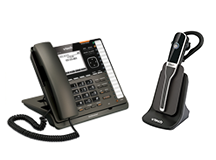What is the Difference Between SIP and IP Phones?

When shopping for telephony services, it is very easy to get confused. Protocols such as IP, SIP, and others are commonly available and it can be hard for the non-techie to decide what exactly they should get. That’s why understanding the difference between IP and SIP is essential so that you can make an educated decision depending on your needs.
IP/VoIP Phones
Short for Voice Over Internet Protocol, VoIP covers any or all phones calls that are made over the internet. The terms IP telephony, voice over broadband, internet telephony, IP communications, broadband telephony, and broadband phone service are used interchangeably with VoIP. As opposed to traditional telephone lines (PSTN), IP phones make use of the internet in order to digitally transfer the voice signal to another telephone or endpoint.
If you are using an IP phone, then you must have a subscription from an IP service provider in order to make use of it. These services are usually offered on a month to month basis. With an IP phone, you can make phone calls just like on a traditional network, however the main difference is that the communication is handled over the internet. Apart from IP phones, there are many other devices that are compatible with IP telephony and are capable of acting like a circuit switched network or TDM, just like an ordinary landline telephone.
SIP Phones
Short for Session Initiation Protocol, SIP is an advanced communications protocol that is being widely used nowadays for managing various multimedia communication sessions such as voice calls and video calls. Most phones these days are SIP-enabled, however not all IP phones are compatible with SIP. You will need to consider this when shopping for SIP phones. SIP defines the messages that are transmitted between endpoints and it oversees establishment, termination as well as other necessary elements of a call. If you are familiar with PSTN technology, then it will be easy for you to picture SIP trunking as PBX trunks. An important thing to note is that SIP phones allow you to transmit all types of media, not just voice. They transmit packets of data that can include voice and other data such as video.
When most people talk about a SIP phones they are generally talking about an on-premises phone system, similar to ISDN lines but with a capability to use the internet. There are many advantages of using SIP phones such as higher call quality, better reporting, more control with an in-house system, lower lifetime costs, etc.
The Key Difference
An easy way to differentiate between SIP and IP phones is their ability to handle calls. IP phones are capable of handling voice calls from person to person while SIP phones allow you to do much more, such as making a video conference call. These days, most service providers offer a combined technology of both VoIP and SIP so that you can get everything you need in one convenient monthly service.

